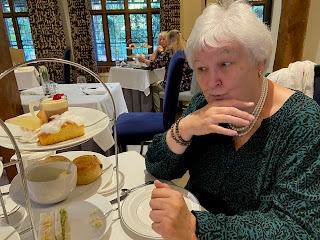Monday was a strangely hectic day. For some weeks Ann had had a glaucoma test planned at the clinic in Bury, but just as we were about to leave the plumber phoned to say he'd got the valve he'd ordered and could come round to repair the system so we could have hot water again. We intended to go on to Edwin's house to water the plants and check all was well, so I said he could come after 3pm. Then the secretary at West Suffolk phoned to say I must have a blood test before my referral letter could be written; luckily there had been a cancelation and we could book a slot at lunch time. Then a red light came on in the car to warn that there was a puncture. I dropped Ann at Edwin's, went for my blood test, then went for a replacement tyre at one of the Bury tyre centres. Annoyingly, at was a screw through the edge of the tyre preventing them from simply repairing the puncture; exactly the same thing happened before, and that tyre was only two months old! By the time we got back, at was ten minutes after the plumber had been, so he had to return next day.
 |
| Ann enjoying her wine-tasting |
Having just taken the dog for a (longish) walk, completed another piece of work for Galen, and now listening to Bach's 48 Preludes and Fugues while typing this blog, it is hard to reconcile the peaceful and enjoyable life I lead with the deadly growth extending in the dark recesses of my lung. The consultant at West Suffolk clearly thought it might be worth attempting further heroic surgery to remove the beast and referred my to Papworth. However, the referral has now been batted back to the oncology team at Addenbrooke's for further assessment. This is the same team that told us over two years ago that I had less than twelve months to live. The cancer nurse phoned this afternoon whilst we were enjoying drinks in the warm October sunshine in the garden of the Swan to quiz me about my state of being, and whether I really want to go through the risk of a major operation. I suspect she may be a little narked that their gloomy prognosis has been demonstrably out, so I laid emphasis on my present good health, stressing that I am still living a full and active life with trips away, and hold hopes for a little longer to enjoy a semi-working retirement. She sounded doubtful but has promised to make a fast-track appointment with the full oncology team at Addenbrooke's Hospital next week. I am now awaiting that appointment and will keep this blog posted with their assessment.
As usual, it is poor Ann who suffers more than I do through all this turmoil. In the absence of pain, I have a certain equanimity about things, taking setbacks as they come and living to enjoy the moment, but for Ann it is an unmerry-go-round of hope and despair, never knowing if I will still be here in three months' time. The uncertainties have gone on for seven years, causing us repeatedly to postpone the possibility of moving house and causing the loss of several big holidays abroad. We were planning to visit Brazil next year with Edwin and Andre to guide us, but again we may have to defer such a trip as we don't know what state my health will be in or if it will coincide with further hospitalisation. We will try to have a quiet week away next month to have a break from these worries.









